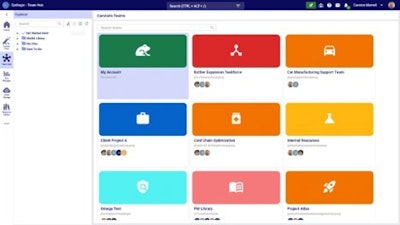
Optilogic launched Enterprise Teams, a new feature set that enables real-time, cross-functional collaboration across shared workspaces. Available now in the Optilogic platform, Enterprise Teams gives users a centralized view of models and files, with synchronized updates and team-level visibility, so supply chain organizations and consultants can work faster, stay aligned, and eliminate version mismatches.
“Enterprise Teams is a response to how companies actually work—globalized, collaborative, and under pressure to take action quickly and accurately,” says Rebecca Janowiak, VP, product management at Optilogic. “We’re giving teams a seamless way to work on the same models in real time, without version issues or visibility gaps slowing them down. This feature helps teams make decisions faster, with better alignment, and fewer surprises. What’s more - commercial grade admin features enable organizations to better manage team members and work content seamlessly and securely. No other supply chain modeling solution has this.”
Key takeaways:
· Enterprise Teams is a purpose-built collaboration layer that gives teams a single source of truth, eliminating data silos, version mismatches, and inefficient handoffs across users, departments, and client projects.
· Enterprise Teams includes a set of core tools designed to streamline collaboration, maintain consistency, and give teams clear visibility into shared work. Any updates made within a team workspace reflect instantly for all members, reducing confusion and eliminating administrative overhead.
· Key capabilities include Teams Hub (switch between personal and team workspaces to access relevant models, files, and analytics); Organization Dashboard (create teams, assign users, and manage compute and storage allocations); Enhanced Sharing (smart suggestions for users and teams simplify file sharing, ownership transfer, and access control); Recent Activity Feed (track who last edited, viewed, ran, or deleted a model, with full team-level visibility); and Centralized Resource Metrics (monitor team-level storage, compute hours, and database usage to support governance and optimization).
· Enterprise Teams supports a wide range of organizational structures, including Function-specific teams (organize projects by domain, such as network optimization or transportation planning); Geographic collaboration (enable regional teams such as North America, EMEA, APAC to build localized models under one umbrella); Client-specific workspaces (ideal for consultants managing multiple engagements with separate data environments); Centralized training and standard templates (create shared repositories for templates, best practices, and standardized content); and Innovation labs and R&D (isolate experimental models from production work for easier iteration and testing).



















